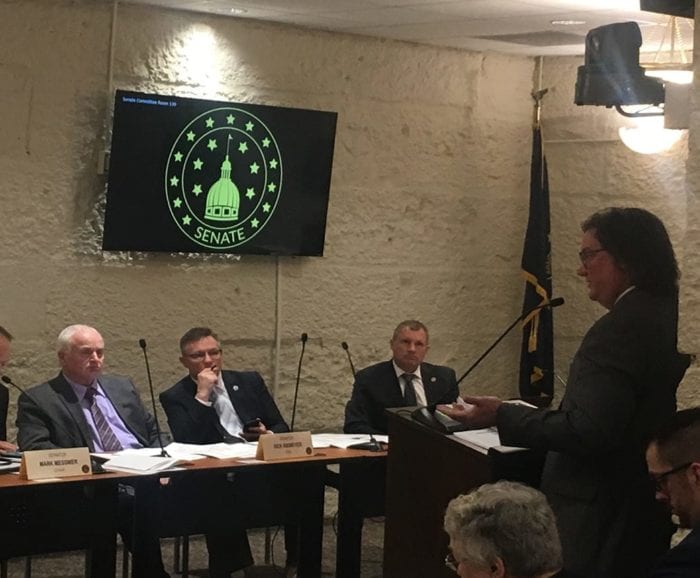Our CEO, Darren Reese, was asked to provide a prepared statement about Senate Bill 592 to the Indiana Senate Environmental Committee on February 18, 2019. Mr. Reese presented the following testimony to the Environmental Committee at the Indiana State House.
Chairman Messmer and Honorable Members of the Indiana Senate Environmental Committee:
I am Darren Reese and I am the President & CEO of the SESCO Group, a 23 year old Indianapolis-Based Environmental Consulting firm. I have been with the firm for 6 years.
With me today, I have Carla Gill. Mrs. Gill is my Director of Remediation Services. Carla has an esteemed tenure in this industry serving in it for nearly three decades. In that time she has served IDEM in various capacities, been a sole proprietor private sector consultant and, for the last 14 years with us at SESCO. She is a wealth of information.
We appear before you today in support of Senate Bill 592.
Like many of our clients, SESCO is a proud member of IPCA. SESCO has offices in Indiana, Ohio, & Kentucky and primarily serve the greater Midwest. Revenues from the IDEM Environmental Liability Trust Fund represent about 30% of our business. In many cases, we receive assignment of ELTF rights from our petroleum clients that have had releases and then we work directly with IDEM regarding Investigation and remediation activities. We are fierce advocates for our clients, and it is our corporate philosophy to be fiscally conservative, especially with public funds.
When the afore mentioned ELTF audit data became public in 2017 and we realized that of the 30-plus states with funds such as ours, we, as traditionally fiscally conservative Hoosiers, were spending nearly 3 times the national average to achieve the same results. We were surprised. That data seemed out of line with the way Indiana conducts its business and we knew it would not be tolerated by the Legislature and certainly not the public.
The ensuing finger pointing and anxiety in the industry regarding how we would eventually work to rectify this situation has been significant. In many ways, it has led us to today.
I contend to you that environmental consultants -as a group- are not responsible alone for the state of today’s ELTF fund practices, IDEM has played a role as well. But please understand, I am not here to point a finger at either the consultant community (even those very dependent on the state fund for their success) or IDEM.
As of today, we are all simply working within the structures available to us.
Rather than be reactive to the reality of the situation, we at SESCO have made it a point to engage IDEM proactively to help them protect the viability of the fund. We want our home state more in line with the national average while still being able to deliver the results our clients expect from us. To do so, we have introduced IDEM to pragmatic measures, improved technology, and suggested practices that are already approved in other states we work in. Some of which have already rendered positive outcomes for all involved parties. If it is the will of the committee, at the conclusion of my statement, I’d encourage you hear a specific example of where Mrs. Gill has worked with IDEM on such a use of technology that has resulted in significant cost and time savings to the ELTF fund and thus, our benefited client.
My firm has never exhausted the available ELTF funds on completing one of our projects. Not when the cap was 2 million dollars, not now at 2.5 million dollars. We have come close when we come in to finish someone else’s project.
Our internal data shows the proposed 1.5-million-dollar cap on direct remediation as outlined in this bill will not be an impediment to our ability to provide service to our clients. But I’m sure you will hear from members of my industry that this will create a hardship. There are members of my industry that bill the ELTF fund more aggressively. While I believe those consultants are outliers, and I do not employ similar practices, I do not believe their actions are outside the law. This bill as presented, along with Senator Mesmer’s amendment, will move our industry in the right direction.
As to standing side by side with IDEM, we don’t always see eye to eye, but, when we can work together to maintain the viability of a fund that benefits operators, buyers, sellers, developers, allows consultants to execute remediation effectively that keeps gas stations that have releases stay viable businesses, thus on tax roles and from becoming -at best- abandon community eyesores, we are in.
I commend Senator Glick, this committee, and all levels of IDEM for addressing this situation.
To me, and to like-minded members of my industry, SB Bill 592 provides a welcome increase in IDEM auditing powers, clarification of the ELTF rules that will provide petroleum owners and their consultants a clear-cut path for establishing the responsible party and transfer of ELTF assignment rights, and the establishment of an Underground Storage Tank Financial Assurance Board will assist IDEM in insisting best practices will be employed by consultants – all of which equate to a longer, more viable lifespan of the fund. We are in.

